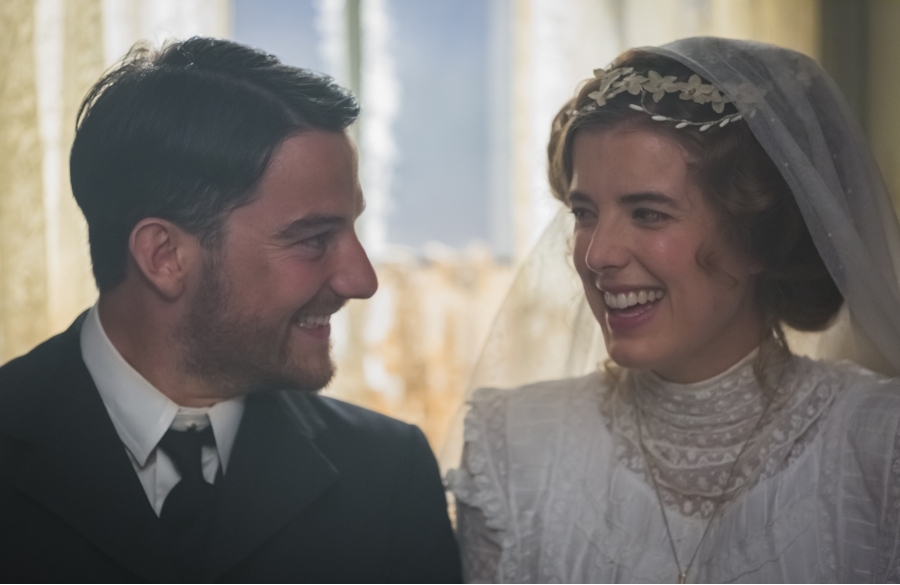“Sunset Song,” adapted from Lewis Grassic Gibbon’s novel, is gay British writer/director Terence Davies’ gorgeous period piece set in rural Scotland in the early 1900s. This striking drama, which opens June 3 at the Ritz, has 14-year-old Chris (Agyness Deyn) first struggling with John (Peter Mullan), her abusive father, and then later falling in love with Ewan (Kevin Guthrie). As the war comes and moods change, Chris finds strength in her harsh existence.
Davies films Chris’ story in exquisite vistas, shot in 70mm, as well as intimate interior scenes, filmed on digital video. His technique creates a vivid sense of time and place.
The filmmaker recently chatted via phone from England with PGN about making “Sunset Song.”
PGN: This new film is, like much of your work, about place and memory. Why do you return to these topics again and again?
TD: I don’t know really. I think my best subject at school was history. When I was about 18, Alec Guinness read the whole of [T.S. Eliot’s] “Four Quartets.” It knocked me out. It was about nature and time and mortality and the perception of the world. I’m obsessed with the nature of time and how it changes, and how objects change, because of perception, over time … I’m obsessed with how we come to terms with mortality — that’s endlessly fascinating and moving to me.
PGN: There’s a line in the film spoken by the narrator, “The dark quiet corpse that was Chris’ childhood … was laid away forever.” You often depict childhood and a loss of innocence in your films. Can you explain your penchant for this theme?
TD: I do remember the past very vividly. I think it’s always been inside of me. I was, as a child, aware of intense happiness. The moment of ecstasy became the most important thing at that particular time. The things that are felt, like music and images, move through time. Music is so powerful. You respond viscerally to it. I think cinema at its best can be like music, should be like music. You go from wonderfully romantic to not-so wonderfully romantic. You go on an emotional journey. You listen and respond to it.
PGN: You shot “Sunset Song” in both 70mm and on digital video. You make the landscapes as gorgeous as a harsh scene of Chris’ brother Will (Jack Greenlees) being whipped by his father, John. Can you discuss your visual approach to the material?
TD: I do think there is no reason why ordinary lives shouldn’t be beautiful. I say that because, in the September term in school, it’s dark when you get home. In row houses, I’d get home from school, the fire was on, a pot of tea was made and there were potato cakes. The only light was from the fire. It was beautiful. Rich and wonderful interiors can be beautiful and accurate. Not just prettiness, but the clutter of things in houses that are there that tell you something about the people. That, and seeing where the light falls, those objects becomes beautiful. They are loved things.
PGN: What can you say about the depiction of masculinity in the film vs. the way women are depicted?
TD: It’s scripted in how men and women can behave. I grew up in the 1950s where the big romantic films — “Magnificent Obsession,” “All that Heaven Allows” — had a woman as the main character. That influenced me emotionally. “Sunset Song” is about a girl from 14-21. It’s about knowing the rigid things you have to do. Ewan is going to be a conscientious objector, but he has to go to war because he is labeled a coward. He comes back and is horrible. I said, “It’s terror, he’s seen the casualty lists.” Of course he was terrified, and it changed him beyond all. It’s just fear. There were rigid ways of behaving. That was true as much for men as it was women. Peter [Mullan] put a lot more warmth in his character. That was a revelation to me. It makes him more horrific when he is nasty.
PGN: What do you think the relevance of a story like “Sunset Song” is for audiences today?
TD: Oh gosh. I have absolutely no idea. Essential stories never change regardless of where they are set. I think it’s a great story. “Escape from New York” — what’s that got to do with the modern world? Very little, and less when you have to put up with that terrible acting in it.
PGN: Your film feels slightly nostalgic, but not particularly sentimental. Can you discuss that?
TD: The problem with nostalgia is that that it implies sentimentality. I don’t like sentimentality. I find it embarrassing. It’s seductive. But as James Joyce calls it, “It is unearned emotion.” It has to be true and felt.
